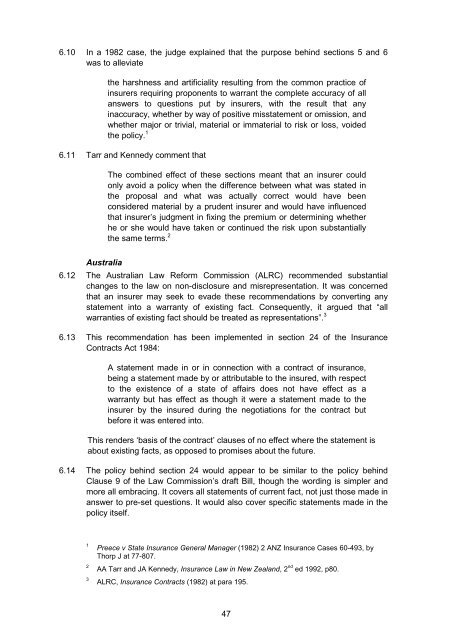Insurance Contract Law Issues Paper 2 Warranties - Law Commission
Insurance Contract Law Issues Paper 2 Warranties - Law Commission
Insurance Contract Law Issues Paper 2 Warranties - Law Commission
Create successful ePaper yourself
Turn your PDF publications into a flip-book with our unique Google optimized e-Paper software.
6.10 In a 1982 case, the judge explained that the purpose behind sections 5 and 6<br />
was to alleviate<br />
the harshness and artificiality resulting from the common practice of<br />
insurers requiring proponents to warrant the complete accuracy of all<br />
answers to questions put by insurers, with the result that any<br />
inaccuracy, whether by way of positive misstatement or omission, and<br />
whether major or trivial, material or immaterial to risk or loss, voided<br />
the policy. 1<br />
6.11 Tarr and Kennedy comment that<br />
Australia<br />
The combined effect of these sections meant that an insurer could<br />
only avoid a policy when the difference between what was stated in<br />
the proposal and what was actually correct would have been<br />
considered material by a prudent insurer and would have influenced<br />
that insurer’s judgment in fixing the premium or determining whether<br />
he or she would have taken or continued the risk upon substantially<br />
the same terms. 2<br />
6.12 The Australian <strong>Law</strong> Reform <strong>Commission</strong> (ALRC) recommended substantial<br />
changes to the law on non-disclosure and misrepresentation. It was concerned<br />
that an insurer may seek to evade these recommendations by converting any<br />
statement into a warranty of existing fact. Consequently, it argued that “all<br />
warranties of existing fact should be treated as representations”. 3<br />
6.13 This recommendation has been implemented in section 24 of the <strong>Insurance</strong><br />
<strong>Contract</strong>s Act 1984:<br />
A statement made in or in connection with a contract of insurance,<br />
being a statement made by or attributable to the insured, with respect<br />
to the existence of a state of affairs does not have effect as a<br />
warranty but has effect as though it were a statement made to the<br />
insurer by the insured during the negotiations for the contract but<br />
before it was entered into.<br />
This renders ‘basis of the contract’ clauses of no effect where the statement is<br />
about existing facts, as opposed to promises about the future.<br />
6.14 The policy behind section 24 would appear to be similar to the policy behind<br />
Clause 9 of the <strong>Law</strong> <strong>Commission</strong>’s draft Bill, though the wording is simpler and<br />
more all embracing. It covers all statements of current fact, not just those made in<br />
answer to pre-set questions. It would also cover specific statements made in the<br />
policy itself.<br />
1<br />
Preece v State <strong>Insurance</strong> General Manager (1982) 2 ANZ <strong>Insurance</strong> Cases 60-493, by<br />
Thorp J at 77-807.<br />
2 AA Tarr and JA Kennedy, <strong>Insurance</strong> <strong>Law</strong> in New Zealand, 2 nd ed 1992, p80.<br />
3 ALRC, <strong>Insurance</strong> <strong>Contract</strong>s (1982) at para 195.<br />
47

















